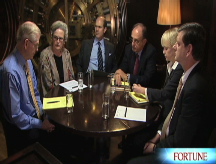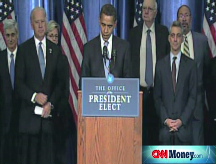CFOs: Recession to last another year
According to 1,275 chief financial officers polled by Duke University, firms will cut spending and slash jobs in 2009. Top execs began predicting recession last fall.
NEW YORK (CNNMoney.com) -- Nearly two-thirds of top-level executives expect the current recession to last another year, according to a survey released Wednesday.
The grim economic outlook is from a survey of 1,275 chief financial officers from public and private companies, all of whom were interviewed for Duke University's CFO Magazine Global Business Outlook Survey.
Last year, CFOs accurately predicted the looming recession. "In September 2007, CFO optimism about the future declined sharply, correctly anticipating the current recession," according to a statement from John R. Graham, director of the survey and a finance professor at Duke's Fuqua School of Business.
"Throughout the history of our survey, CFOs have shown remarkable ability to predict future economic conditions," he added. "Therefore, the record pessimism CFOs are currently expressing is ominous."
The survey has been conducted for 51 consecutive quarters - or nearly 13 years.
A record 81% of CFOs from the United States are more pessimistic about the economy this quarter than last quarter, which is twice as many pessimistic U.S. CFOs than last quarter. Among European and Asian CFOs, 85% of respondents are more pessimistic this quarter.
Furthermore, 60% of CFOs say the United States will not come out of recession until at least the fourth quarter of 2009. And 71% of European CFOs expect the European economy to be in recession until the last quarter of 2009.
The primary concern of companies was weak consumer demand, according to the report. As the economy has fallen into recession, home foreclosure rates have increased and employees become concerned about losing their job, consumers have reined in their spending.
CFOs predicted that employment would fall by 5% in the U.S. and Europe by 0.5% in Asia in 2009.
Companies are cutting back in the face of uncertain times.
"The uncertainty about both near-term and long-term conditions has made it nearly impossible for executives to plan for the future," said Kate O'Sullivan, senior writer at CFO Magazine, in a statement. "Even firms that are doing relatively well are still cutting back 'just in case,' exacerbating the situation."
Spending on capital was expected to drop by 10% in all regions in the coming year, according to the survey. Tech spending should fall 4% and dollars spent on marketing and advertising were expected to decline by 7%.
CFOs predict that earnings should fall by 9% in the coming year, with the manufacturing industry and the transportation-energy sector taking the worst hits.
Credit concerns: As credit markets tightened in the wake of the collapse of Lehman Brothers, governments and central banks across the globe have moved to juice their economies with liquidity. Lending rates have come down for a lot of banks and financial institutions, and the government has backstopped a lot of transactions, but smaller businesses still have a harder time obtaining loans at descent rates.
Companies rated "B" or lower face interest rates that are 2.25% higher than their cost of borrowing before the crisis began.
According to the survey, 62% of companies affected by the credit crisis say they cannot access the credit they need and around half of the companies that can access credit say that it costs more. Lending conditions were reported to be tighter for lower-rated firms.
"The inability to access credit is just the tip of the iceberg," said Campbell Harvey, Fuqua international finance professor and founding director of the survey, in a statement. "This is also a crisis of confidence. "
CFOs are concerned about the health of the financial institutions in their economy. More than 70% of U.S. and European firms are concerned about the state of their financial institutions. And for those companies that use financial derivatives, 75% are afraid of default.
Poor business conditions have spread across the globe. Of those firms in Europe affected by the credit crisis, 65% say the cost of credit is more expensive, if it is available at all, and 57% said they can't get the cash they need. In China, 52% of those companies affected by the credit crisis report having had difficulty establishing or renewing a line of credit, and 47% say they cannot access the credit they need.
With CFOs concerned about the health of the economy, consumer demand and the other businesses with which they enter into transactions, "right now, job number one for CFOs is to make sure the firm survives - and they're taking drastic actions," said Harvey. ![]()





